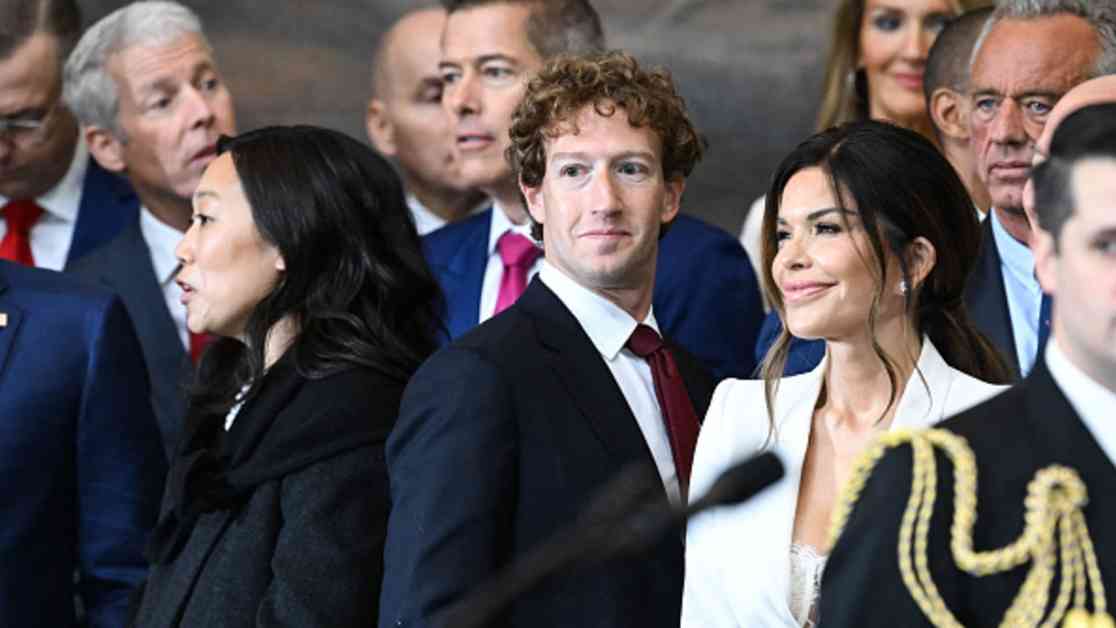Mark Zuckerberg, the renowned CEO and founder of Meta, formerly known as Facebook, has recently sparked controversy with his strategic pivot towards Apple. This unexpected shift has raised concerns among Meta’s staff, leading to a sense of unease and uncertainty within the company. As Zuckerberg aligns himself with former President Donald Trump, Meta employees fear the consequences of this newfound alliance.
Meta’s Rightward Shift Under Zuckerberg’s Leadership
At the onset of 2025, Zuckerberg publicly declared his intention to prioritize “free expression” on Meta’s platforms while collaborating with President Trump to combat governmental regulations that hinder innovation. However, what Zuckerberg failed to disclose in his address was the utilization of internal moderators to suppress any dissent or criticism from Meta employees regarding his plans. This lack of transparency has fueled apprehension and skepticism among the company’s workforce.
The visit of Zuckerberg to the White House on February 6th, under the guise of enhancing American technological dominance globally, has further solidified Meta’s trajectory towards a more conservative stance. The company’s staff, numbering close to 75,000 individuals, are grappling with an evolving corporate culture that appears to be moving in lockstep with Trump’s second term in office. The influence of Zuckerberg, a 40-year-old tech magnate, looms large over Meta’s operations, prompting employees to question the future direction of the company.
Amidst a backdrop of layoffs and restructuring, Meta has resorted to censoring dissent within its internal social network, Workplace, in a bid to stifle negative feedback from employees. Those who voiced concerns were warned that their statements could affect their performance reviews, fostering an environment of fear and intimidation within the organization. As Meta undergoes a series of job cuts aimed at removing underperforming staff, tensions run high among employees who fear the repercussions of speaking out against the company’s policies.
Meta’s Strategic Maneuvers Against Apple
Zuckerberg’s calculated overtures towards the Trump administration are not without strategic motivations. By aligning Meta’s interests with those of Trump, Zuckerberg hopes to shift the former president’s focus towards Apple, Meta’s longstanding rival. The contentious relationship between Meta and Apple dates back to Apple’s 2021 iOS privacy update, which significantly impacted Meta’s advertising revenue. Zuckerberg’s animosity towards Apple has only intensified in recent years, culminating in a concerted effort to deflect antitrust scrutiny away from Meta and towards Apple.
In a bid to exert pressure on Apple, Meta has embarked on a series of policy changes aimed at challenging Apple’s dominance in the tech sphere. By relaxing content moderation guidelines and terminating its diversity, equity, and inclusion program, Meta aims to position itself as a formidable opponent to Apple’s perceived monopolistic practices. Zuckerberg’s strategic maneuvers against Apple underscore his willingness to take calculated risks in pursuit of gaining a competitive edge in the tech industry.
Joel Kaplan, a key figure within Meta’s policy division, has emerged as a prominent advocate for the company’s rightward shift under Zuckerberg’s leadership. With a background in Republican politics, Kaplan’s appointment to a senior position within Meta’s policy team has signaled a clear departure from the company’s previous stance. Kaplan’s alignment with conservative ideologies, coupled with Meta’s policy changes, reflects a deliberate shift towards a more politically charged atmosphere within the company.
In conclusion, Meta’s recent pivot under Zuckerberg’s leadership marks a significant departure from its previous trajectory, signaling a new era of strategic realignment and policy shifts. As the company navigates the complex landscape of tech politics, the repercussions of its alliance with the Trump administration remain to be seen. The evolving dynamics within Meta’s corporate culture highlight the far-reaching impact of Zuckerberg’s strategic decisions on the company’s future.

























